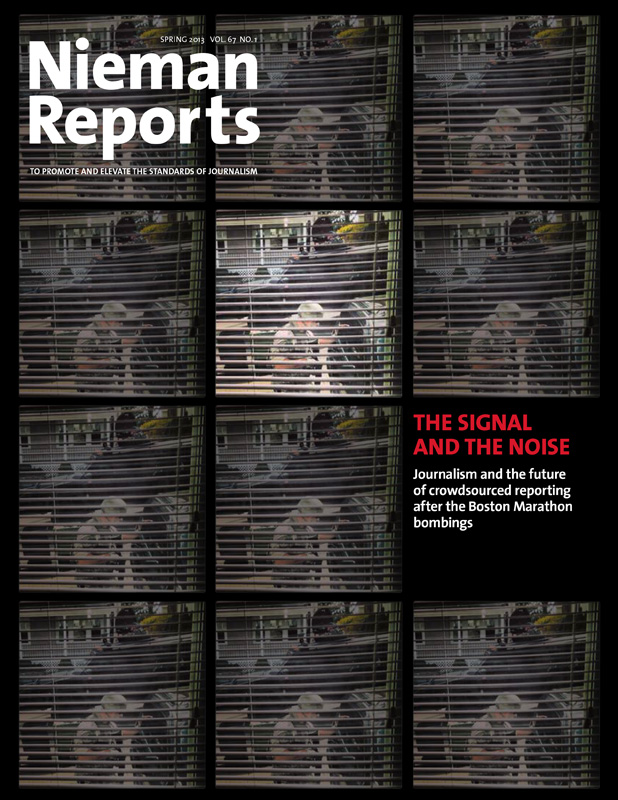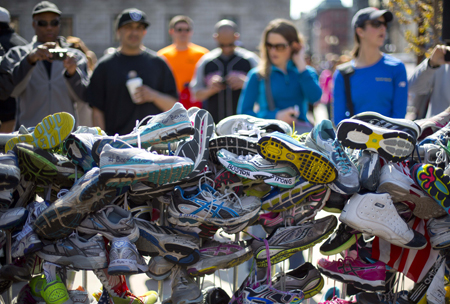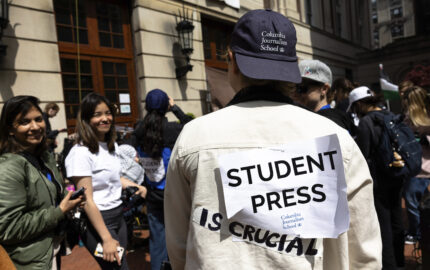
The Signal and the Noise
One tweeter boasted of a "game-changing victory" for crowdsourcing in the early hours of the Boston area manhunt. But what began as a low-grade fever on social media spiked with the wrongful naming of a bombing suspect. All the while, Nieman Visiting Fellow Hong Qu was testing his new tool Keepr as a screen for credibility and posting early results on Nieman Reports as the story unfolded. Qu and journalist Seth Mnookin, who tweeted live from the manhunt, write about how smartphones and their unprecedented power to publish require new journalistic tools and practices, while other Nieman Fellows consider the intersection of social media and journalism in the aftermath of the attac

An impromptu memorial for victims of the Boston Marathon bombings. Photo by Robert F. Bukaty/The Associated Press
I first heard the news on the radio. There had been an explosion in my hometown, then another. There were fatalities; hundreds injured, many having lost limbs.
I grabbed my phone, but not to check the news. For this was March 11, 2004, and an al-Qaeda attack had just killed 191 people and injured hundreds more in Madrid, where I live. There were no smartphones. There was no Twitter. I was blind, working by intuition and with little information. I was with El Mundo at that time, so grabbed my phone to deploy reporters to several of Madrid’s train stations.
I was reminded of the Madrid train attacks as I followed the search for the Boston Marathon bombing suspects. But unlike Madrid, this time I was overwhelmed with information.
Breaking news coverage has always been tricky; there’s nothing new about that. But much else about journalism after the Boston bombings is new. We now live in a world of real-time news, a world in which it will be increasingly rare for a professional journalist to be first to report the news. Twitter will always win.
The real battle for professional news organizations and professional journalists is not about breaking news anymore; it’s about exclusivity and context. Being fast still matters, but it’s a very different kind of speed. Being fast in explaining the conflict in Chechnya, for example, or Russian concerns about Tamerlan Tsarnaev, one of the Boston Marathon bombing suspects, is the kind of “first” that really adds value.
In situations filled with noise, we need to make our voices clear and, just as importantly, to remain silent when we have nothing to report. Adapting to this new environment won’t be easy, but I love what technology has brought to journalism: new voices, more sources, better engagement, measurable rewards, and, to be sure, new difficulties.
In the old world, television broadcasters competed with television broadcasters, newspapers with newspapers, radio stations with radio stations. But during the search for the Boston bombing suspects, everyone competed with everyone else—cable TV, network TV, local TV, local newspapers, global newspapers, prestigious magazines, crappy magazines, NPR, police departments (and their scanners), MIT and Harvard Twitter and Facebook accounts, along with all the smartphone-equipped citizens attracted by the great show. What all this coverage demonstrated may seem surprising: We need professional journalists more than ever.
To stand out in this chaotic environment is a challenge, but also a necessity, and probably an obligation. News outlets that stand for rigor, quality and transparency should embrace this role.
While the newspaper business is definitely at risk, journalism is definitely not. Successful news organizations need to strengthen the core values of accuracy and integrity. But, without understanding the importance of the new active audience, we will never capture the big picture. According to a survey by Pew Research, 80 percent of Americans followed the search for the Boston bombing suspects on TV, about half (49 percent) kept up online or on a mobile device, 38 percent tracked the story on radio, and 29 percent relied on newspapers. “While television was the public’s top source for news on the bombing overall,” according to the Pew report, “people younger than 30 were as likely to follow this news online as on television.”
The way people consumed and interacted with news during the Boston bombings gives us a glimpse of where things are headed. As ice hockey legend Wayne Gretzky used to say, “You should skate to where the puck is going, not where it has been.” The puck is this under-30 demographic, and it’s going online. But this audience lives in a fragmented news world, jumping from one story to another, with weak emotional connections to the brands that deliver those stories. Without those connections, it will be complicated to build long-term business models.
A lot will be different in the digital world, and a lot can be better. Our ability to engage with audiences in a truthful and collaborative way, as equals, is so amazing that it’s hard to be pessimistic. It may be the best time in history to be a journalist. But we need to work hard to earn the respect and loyalty of consumers, who are ultimately the only ones who can sustain the social role of our profession.
Borja Echevarría de la Gándara, a 2013 Nieman Fellow, is deputy managing editor of El País in Madrid. This article is adapted from the keynote speech he delivered at the Crimson Journalism Conference at Harvard in May.
MORE COVERAGE OF THE BOSTON MARATHON BOMBINGS
Organize the Noise: Tweeting Live from the Boston Manhunt
By Seth Mnookin and Hong Qu
Reporting on Radicalization
By Souad Mekhennet
Curation Is the Key to Bringing Social Media and Journalism Together
By Ludovic Blecher
The (New) Industry Standard: Making Citizen Broadcasters into Citizen Journalists
By Betsy O'Donovan


